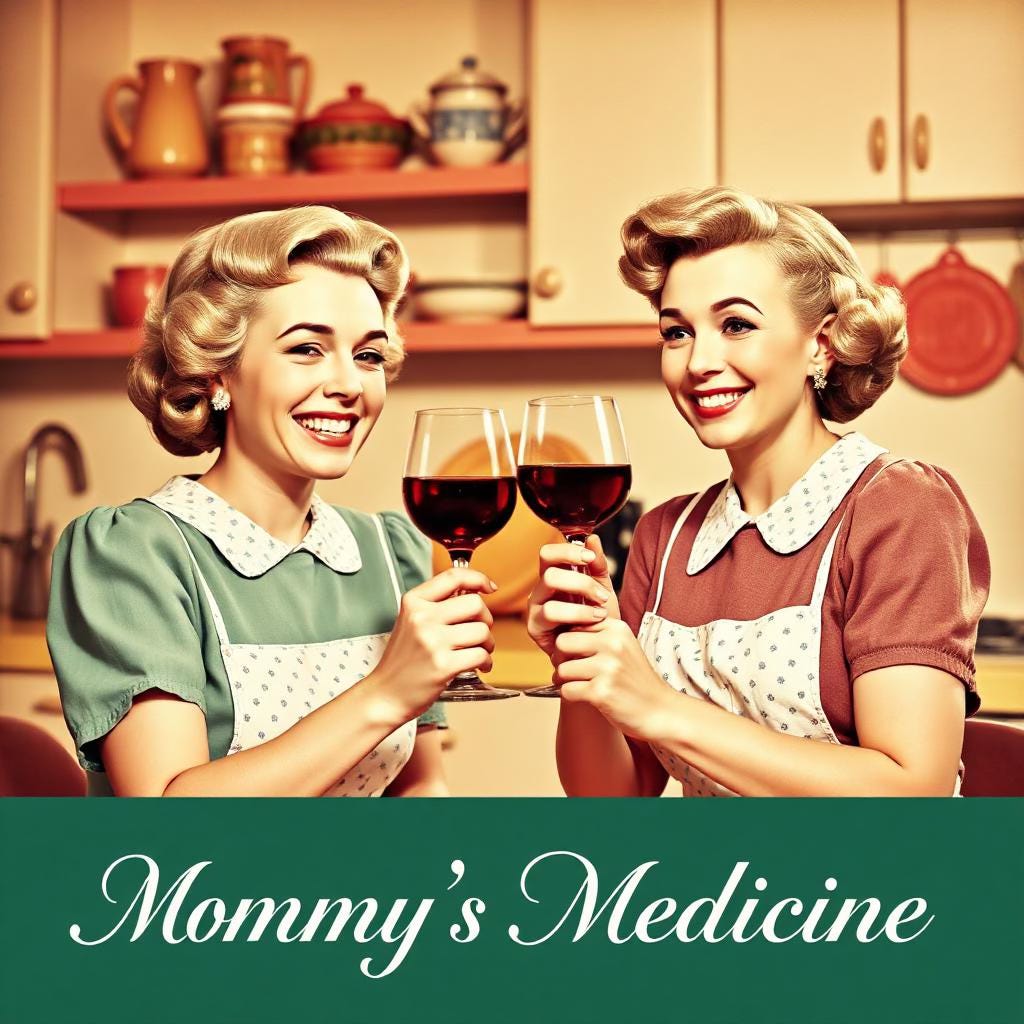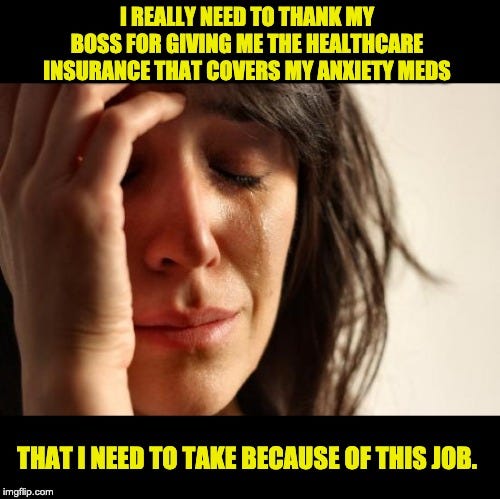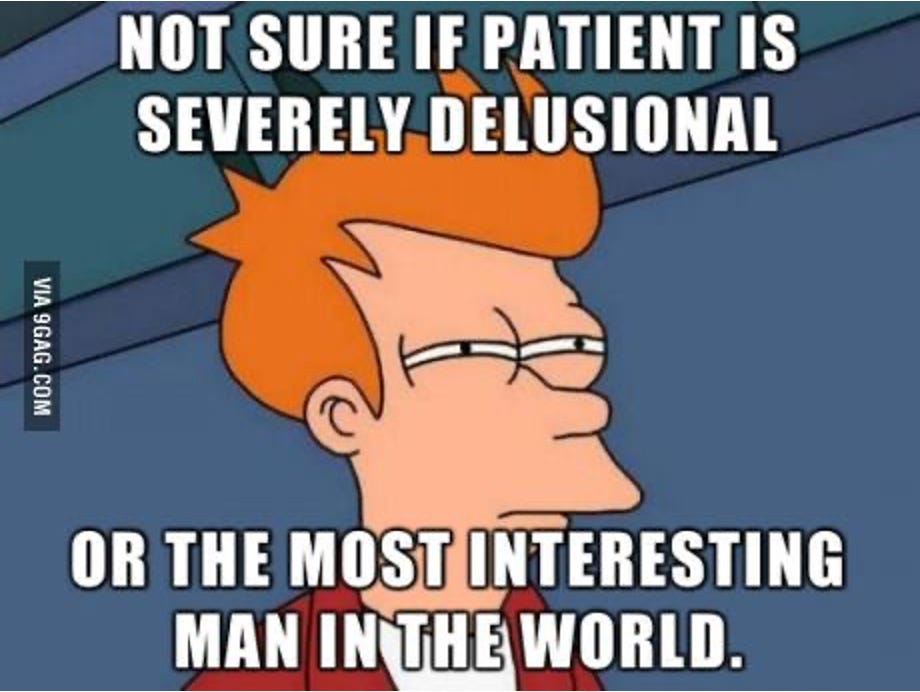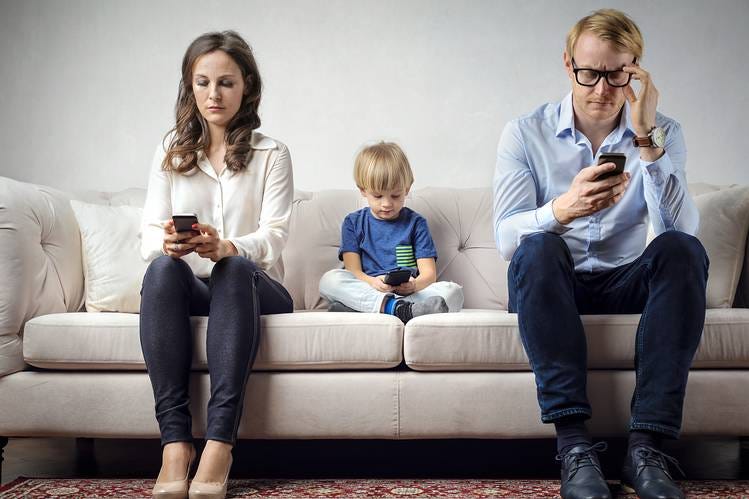"I realized I've been self-medicating my depression with alcohol for years," Michael announced proudly during our third session, as if he'd achieved some profound insight. "My psychiatrist says it's common—I'm just trying to correct my serotonin imbalance with the wrong chemicals." He beamed with the satisfaction of someone who finally understands what's wrong with them.
I had to suppress an eye-roll that would have registered on the Richter scale.
Psychiatrists fucking love this shit. Nothing gets them more excited than someone who bought into the idea they have a mysterious chronic illness called "Major Depressive Disorder" and they've been "self-medicating" for years. It's the perfect setup. Now the patient no longer has to “self-medicate”—they can use the "real medicine" that's manufactured in a sterile factory, blessed by the FDA, and—purely coincidentally—makes billions for the mental health industrial complex. The psychiatrist hasn't just gained a patient; they've gained a lifelong customer who believes they require chemical management from cradle to grave.
FYI- if he would have just stopped drinking alcohol every day he would have felt profoundly better. Instead he replaced one drug with another.
What Michael didn't realize—what most people don't—is that he'd just parroted one of the most masterful pieces of bullshit ever concocted by the psychiatric-pharmaceutical complex. His psychiatrist was practically giddy delivering this "diagnosis." Of course she was. She'd just converted Michael's drinking into evidence of an underlying brain disease that—coincidentally!—required the exact pills she was selling.
Think about this insanity for a moment. If you're "self-medicating," that implies:
You have a disease (you don't)
That disease requires medicine (it doesn't)
You're using the wrong medicine (according to whom?)
The right medicine comes from the doctor (how convenient!)
The absurdity is almost art. This bullshit has been so thoroughly integrated into our popular culture that we don't even question it anymore. Every sitcom character who reaches for wine after a bad day, every movie scene with someone stress-eating ice cream, every celebrity "confessing" to their substance use—they're all reinforcing the same narrative: That anyone who turns to a substance or behavior for comfort (which is basically everyone alive) must be "medicating" an underlying mental illness they were not addressing.
The message is crystal clear: Being human is just too goddamn painful, and your wine, food, shopping, or social media scrolling isn't just a response to stress (probably a bit self defeating)—it's you "treating" your illness ineffectively.
The alcohol isn't enjoyment—it's bootleg Prozac. The chocolate isn't pleasure—it's counterfeit Xanax. Of course, the solution isn't to examine why modern life feels so empty and painful. No, no—the answer is to abandon your amateur "self-medication" and turn to the sanctioned numbing agents that come with official-looking labels and co-pays. How convenient for an industry that profits from your perpetual patienthood.
As a psychologist who's spent decades watching language reshape reality, I'm continually amazed by the elaborate fictions we've collectively agreed to believe. The wine isn't to unwind after a stressful day—it's "self-medication." The ice cream after a breakup isn't comfort food—it's "treating your depression." The video games aren't fun—they're "managing your ADHD symptoms."
We've medicalized every aspect of human experience, and it's time we called out these lies we tell ourselves.
This should be fun.
I’m Not Stressed, I Have an Anxiety Disorder
We are conscious beings painfully aware of our own mortality. We're the only creatures on this planet cursed with the ability to replay traumatic events from our past and project catastrophic scenarios into our future. We can literally think ourselves into a panic at 3 AM about shit that happened a decade ago or might never happen at all.
Life isn't just "stressful"—it's a goddamn existential nightmare. We're sophisticated animals trying to survive in a society that bombards us with images of war, terrorism, economic collapse, climate disaster, and the latest deadly pandemic—all while expecting many to show up to soul-crushing jobs with a smile. You can't turn on the television or scroll through your feed without being force-fed a buffet of horror designed to keep you perpetually terrified and consuming.
But no, no—you're not experiencing the completely normal psychological response to living in this dystopian hellscape. According to psychiatry, you have an "anxiety disorder." You see, your brain is malfunctioning! The fact that you're losing sleep over the possibility of nuclear war, financial ruin, the collapse of civilization, or my likely that email you impulsively sent yesterday-isn't a rational response to actual threats—it's a chemical imbalance! How convenient.
The most absurd part? We're supposed to believe that ignoring all this shit is "healthy." That being numb to the horrors of existence is the goal. That disconnection from reality is the pinnacle of mental wellness.
I remember early in my career working with a 14-year-old girl who called me out on this exact bullshit. She was an accomplished student, award-winning poet who had somehow "contracted" the depression and anxiety disease. Her psychiatrist wanted her on Prozac. Her parents wanted her in therapy. And there I was, working my ass off to "make her feel better."
One day she just stopped me cold: "You're working too hard to fix me," she said. "Did it ever occur to you that I never want to lose this part of myself? Being connected to the pain of the world? Being realistic about the dark side of living? The anxiety my parents believe I struggle with is ok for me because I feel for other people. This fuels my art. I want to think deeply about life."
At fourteen years old, she saw through the scam that most adults never question. Of course, being this aware at her age wouldn't make her very fun at parties—but that was perfectly fine with her. She understood something profound: that her "symptoms" weren't a malfunction but a form of clarity, a refusal to participate in collective denial. There is actually something called depressive realism- somebody who fully faces the depressing aspects of living. To deny reality would require a fairly impressive form of detachment and denial- which she has said “No Thank You!” Yet according to the DSM, this clarity needed to be medicated away so she could better adjust to an insane world.
And what's the solution? Is it examining the deeply sick society we've created and finding ways to make change in the world? Is it questioning why we've built a world that feels increasingly unlivable? Of course not. The answer is to see your doctor for some pills that will help you stop giving a fuck about the very real dangers surrounding you. Or better yet, spend an hour a week with a therapist who'll teach you "coping skills" so you can better tolerate the intolerable without actually changing anything.
I'm Not Just Sad, I'm Clinically Depressed
Have you noticed that practically nobody under 40 uses the word "sad" anymore? It's been completely eradicated from their emotional vocabulary, replaced exclusively by "depressed." This isn't a coincidence—it's a perfect example of how medical language has colonized normal human experience.
"I've been so depressed lately," Emma, a 23-year-old client, told me during our first session.
"Can you tell me more about what you're experiencing?" I asked.
"You know, I'm depressed. Like, clinically. I've been feeling really down since I graduated college. My degree was supposed to open doors, but I'm stuck in this entry-level job that barely covers rent. And now my roommate is moving out, so I either have to find someone new or crawl back to my parents' basement. It's just... crushing me."
"So transitioning from college into the working world hasn't lived up to expectations?" I clarified. "And now your living situation is adding even more pressure?"
She looked at me like I'd completely missed the point.
"No, like, I'm actually depressed. I took a quiz online, and it said I have moderate-to-severe depression. I'm not just disappointed or whatever. I'm clinically depressed. Like, it's a chemical thing in my brain. My TikTok feed is full of people with the exact same symptoms. One of the creators is even a therapist, and she says feeling overwhelmed by adulthood is actually undiagnosed depression."
She actually had the prescription of Lexapro to prove it. She pulled it from her purse and placed it on the table between us like a medal of authenticity.
"See? I reported these same symptoms to my primary care doctor last week. Took her all of fifteen minutes to confirm what I already knew."
Now I knew what I was up against. A “real doctor” validated her chemical imbalance now it was going to be nearly impossible for me to prove otherwise. The brainwashing was reinforced by a medical expert. This is when I get those bad google reviews on line.
“Here we go again”, I thought to myself.
The prescription validated her reality—her suffering wasn't just normal post-college disillusionment that countless generations have experienced. Of course, it's a special kind of soul-crushing for her generation. Saddled with $200,000 in student loans and facing the brutal truth that her gender studies degree with a minor in social justice activism afforded her nothing more than making lattes for the tech bros who skipped college entirely, her situation was genuinely depressing.
But confronting that reality—that perhaps her life choices rather than her neurotransmitters were the problem—was too excruciating to bear. Much easier to believe her brain was chemically defective. Now she had the pharmaceutically-endorsed documentation to prove it, complete with refills and a follow-up appointment. What she was feeling couldn't possibly be the normal consequences of expensive, useless education in a merciless economy. No, it must be a disease requiring medication.
This is where the entire fucking scam becomes clear. "Sad" is no longer strong enough to describe human suffering or to command attention and care. It doesn't carry enough weight. It doesn't demand enough intervention. It sounds too... normal.
You see, if you're just "sad" about losing your job, relationship falling apart, or living situation changing, then you're experiencing a common human emotion that billions of people throughout history have managed to endure without medical intervention. Your pain isn't special. It isn't unique. It doesn't require experts or prescription pads.
But if you're "depressed"? Well, that's different. That's a medical condition. Your sadness is much more intense. It requires special attention.
I certainly understand the appeal.
We've medicalized language as a form of emotional validation. "My sadness isn't like other people's sadness. Mine is much, much worse. It's so bad it's literally a brain disease that requires professional intervention. You have to help me because I'm not just upset—I'm sick."
And the mental health industry loves this shit because it converts every human being who's ever experienced a difficult emotion into a potential patient. Every breakup, job loss, death, or disappointment becomes an opportunity for diagnosis and treatment. Every tear becomes a dollar sign.
My Child Isn't a Product of Modern Hell, They Have ADHD
Let's talk about the greatest magic trick of all: convincing an entire generation that their inability to focus on mind-numbing busywork while surrounded by the most advanced attention-hijacking technology in human history is somehow a brain disorder.
Your kid can't sit still for seven hours under fluorescent lights in a cinder block room memorizing state capitals? Must be ADHD!
Your teenager can't focus on homework after spending six hours being bombarded by algorithmically-perfected dopamine hits from TikTok and Instagram? Clearly a neurological condition!
You find it hard to read three consecutive pages of a book without checking your phone seventeen times? Better get that frontal lobe examined, buddy!
Here's a wild thought: Maybe—just maybe—our modern lifestyle is completely incompatible with how human brains actually evolved to function.
We take children designed by evolution to run, climb, explore, and learn through direct experience, and we trap them in sterile classrooms under artificial lighting for eight hours a day. We feed them breakfast cereal that's chemically indistinguishable from dessert, lunch that comes in plastic packaging with ingredients lists longer than this article, and snacks engineered by teams of scientists to be literally addictive.
We give them devices specifically designed by the brightest minds in Silicon Valley to fragment attention and create dependency. We surround them with endless streams of content scientifically optimized to trigger dopamine release. We disconnect them entirely from nature, physical labor, and any form of delayed gratification.
Then—and this is the real chef's kiss of fucking absurdity—we express shock and medical concern when they can't concentrate on filling out worksheets.
"I don't understand why little Jayden can't just sit quietly and do his multiplication tables," says Mom, while scrolling Instagram and watching Netflix simultaneously. "His doctor says it might be ADHD. We're thinking about trying medication."
Of course you are! It's obviously Jayden's brain that's the problem—not the fact that he's been trained since infancy to expect instant gratification, constant entertainment, and endless novelty. It couldn't possibly be that we've created an environment so profoundly misaligned with human neurology that almost no one can function optimally within it. Jayden somehow can hyper-fixate on his I-Pad and acts like a crack addict when it’s not available.
Look, I'm not saying attention difficulties aren't real- they clearly are. I'm saying that maybe—before we start drugging four-year-olds—we should consider that we've built a world that makes focusing nearly fucking impossible for everyone. Maybe the problem isn't that your kid has a disorder. Maybe the problem is that we're all living in a dystopian attention-harvesting experiment and some of us are canaries in the coal mine.
But sure, let's ignore the hardware store worth of environmental and lifestyle factors that might be relevant. Let's pretend it's a simple neurotransmitter issue that can be fixed with stimulants. That way, your kid can better adapt to a profoundly sick system instead of us having to question whether the system itself is the true pathology.
After all, it's much easier to drug a child than to put in the work to change the mess created.
When You Can't See the Bars Because They're Made of Beliefs
The truly terrifying part of all this isn't just that we've been lied to—it's that we've internalized these lies so completely that we now tell them to ourselves. We've passively absorbed these messages and allowed them to reshape our very perception of reality. The medicalization of normal human experience has become so ubiquitous that we accept it as collective truth without question.
The most insidious form of control isn't the obvious kind that constrains your body—it's the subtle type that convinces your mind to pathologize itself. We've engineered a perfect system of psychological subjugation, where the chains are invisible but just as binding. We call it treatment, care, mental health awareness. But look at what it actually creates: an entire population conditioned to believe there's something fundamentally wrong with them.
This brilliant mechanism drives our attention to the thoughts, emotions, and memories that make up our human experience and teaches us to judge them as defective, disordered, diseased. We're trained to monitor our inner lives for "symptoms" rather than meaning. We learn to fear our own minds rather than understand them.
And here's the most perverse part: this self-pathologizing creates the very distress it claims to address. When you believe your brain is broken, when you interpret every difficult emotion as evidence of illness, when you see your struggles as symptoms rather than responses—you amplify your suffering. You add a layer of shame, fear, and hopelessness to your original pain. Your anxiety about having anxiety creates more anxiety. Your depression about being depressed deepens your depression.
This manufactured distress and dissatisfaction feeds an endless cycle of consumption. Feel bad? Here's a pill. Still feel bad? Here's a stronger pill. Still struggling? Try this therapy, this supplement, this wellness retreat, this mindfulness app, this self-help book. None of them working? It's not that the premise is flawed—it's that you haven't found the right product yet!
Next time you reach for that glass of wine after a stressful day, maybe just admit you enjoy the taste and the feeling—no pathologizing required. Next time you feel sad about a loss, maybe just let yourself grieve without diagnosing it. Next time the world seems bleak and terrifying, maybe consider that your fear isn't irrational—it's a sane response to the actual state of things.
RESIST
I try to keep RADICALLY GENUINE as free as I can, but it takes quite a lot of work. If you find some value in my writing and podcast I very much appreciate the paid subscription. It really helps me continue putting time aside for these pieces. Thank you.









https://www.midwesterndoctor.com/p/why-do-all-vaccines-cause-harm?utm_source=publication-search
I am a psychologist from Denmark, and I almost completely agree with your position. Five-eight years ago, I would have agreed completely. Today I have a better understanding of all the damage caused by vaccines. That we are all more or less vaccine damaged. So the chemical imbalance in the brain is BS, and psychotropic drugs are not the solution. But I think many people have brains that are not functioning optimal because they are vaccine damaged. And the younger generations have had more vaccines, and are therefore more damaged. Also Toby Rogers is worth reading on this topic. So we need to end the embracing of victimization, learn to accept obstacles as an opportunity to learn and grow. But we also have to stop vaccinating.
Psychiatry is a crime against humanity.
“We inhabit a world of psychic dislocation where we must either cooperate with lies, remain silent in the face of them or stand up and confront them. The psychological stress this Hobson’s choice exerts is enormously destructive. The instability and vulnerability to mental illness which the pressure to conform sows, can destabilize organizations, institutions and entire movements.” ~ Michael Hoffman
I came to the conclusion that the purpose of propaganda in communist countries was not to persuade, much less to inform, but to humiliate and emasculate. In this sense, the less true it was, the less it corresponded in any way to reality, the better. The more it contradicted the experience of the persons to whom it was directed, the more docile, self-despising, and impotent they became for their failure to protest.”
—Theodore Dalrymple, The Wilder Shores of Marx: Journeys in a Vanishing World